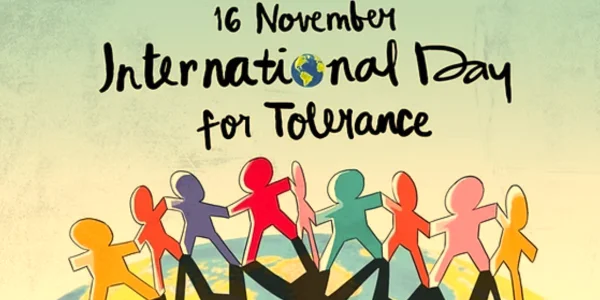Observed annually on November 16, the International Day for Tolerance emphasizes the importance of fostering mutual understanding, respect, and coexistence among diverse communities. Established by the United Nations Educational, Scientific and Cultural Organization (UNESCO) in 1995, this day serves as a reminder of the value of tolerance in promoting peace, human rights, and sustainable development.
Here’s a comprehensive overview of the origins, significance, and ways to celebrate the International Day for Tolerance, along with its role in building a more inclusive world.
History and Origins

The International Day for Tolerance was proclaimed in 1995, marking the 125th anniversary of Mahatma Gandhi’s birth, a global icon of nonviolence and tolerance. It also coincided with the adoption of the UNESCO Declaration of Principles on Tolerance, a landmark document defining tolerance as “respect, acceptance, and appreciation of the rich diversity of our world’s cultures, forms of expression, and ways of being human.”
The declaration underscores that tolerance is not just moral duty but also a political and legal requirement, vital for upholding human rights, pluralism, and democracy.
What is Tolerance?
Tolerance is more than mere acceptance; it is the active practice of recognizing, respecting, and valuing the diversity of people and their perspectives. UNESCO defines tolerance as:
- Respect for Diversity: Embracing different cultures, religions, and ideologies.
- Active Engagement: Promoting dialogue and understanding to resolve conflicts peacefully.
- Rejection of Discrimination: Denouncing intolerance based on race, gender, language, religion, or other distinctions.
In a world increasingly interconnected yet polarized, tolerance plays a crucial role in ensuring peaceful coexistence and shared progress.
Significance of the Day
The International Day for Tolerance holds profound importance in addressing global challenges:
- Promoting Peace: By encouraging dialogue and understanding, tolerance helps prevent conflicts and fosters harmony.
- Upholding Human Rights: Tolerance aligns with the Universal Declaration of Human Rights, ensuring equality and dignity for all.
- Fostering Inclusivity: It combats exclusion, marginalization, and xenophobia, promoting equitable participation in society.
- Advancing Sustainable Development: Tolerance is essential for achieving the Sustainable Development Goals (SDGs), particularly Goal 16, which focuses on peace, justice, and strong institutions.
UNESCO-Madanjeet Singh Prize for the Promotion of Tolerance and Non-Violence
To further promote tolerance, UNESCO established the UNESCO-Madanjeet Singh Prize for the Promotion of Tolerance and Non-Violence in 1995. Named after Indian writer and diplomat Madanjeet Singh, the biennial prize honors individuals, institutions, and organizations that have made significant contributions to fostering tolerance and nonviolence.
The prize not only celebrates efforts to combat intolerance but also inspires others to embrace diversity and work towards peaceful coexistence.
Challenges to Tolerance in the Modern World
Despite global efforts, intolerance continues to manifest in various forms:
- Discrimination and Prejudice: Racial, religious, and cultural biases remain pervasive, fueling divisions and injustices.
- Misinformation and Hate Speech: Social media platforms often amplify hate speech, creating echo chambers and spreading misinformation.
- Political Polarization: Growing ideological divides have exacerbated intolerance in many societies.
- Economic Inequalities: Socioeconomic disparities breed resentment and exclusion, hindering tolerance and unity.
Addressing these challenges requires collective action by governments, civil society, and individuals.
How the Day is Celebrated
The International Day for Tolerance is observed worldwide through diverse activities that promote dialogue, education, and awareness:
- Educational Campaigns: Schools and universities organize workshops, seminars, and debates on the importance of tolerance and diversity.
- Community Initiatives: Local events, such as interfaith dialogues and cultural exchanges, foster understanding among different groups.
- Art and Media: Artistic expressions like films, exhibitions, and theater performances highlight stories of tolerance and inclusion.
- Social Media Campaigns: Hashtags and online movements spread awareness about tolerance and encourage people to share messages of unity.
- Policy Dialogues: Governments and international organizations host discussions on strategies to combat intolerance and promote inclusive societies.
The Role of Education in Promoting Tolerance
Education is a cornerstone in building a culture of tolerance. UNESCO advocates for:
- Incorporating Diversity in Curricula: Teaching about different cultures, religions, and histories fosters mutual respect.
- Promoting Critical Thinking: Encouraging students to question stereotypes and challenge biases helps combat intolerance.
- Encouraging Empathy: Interactive activities, such as role-playing, enable individuals to understand others’ perspectives.
- Addressing Bullying and Discrimination: Schools must adopt policies to prevent and address exclusionary behaviors.
How You Can Contribute
Individuals can play a vital role in promoting tolerance. Here are a few ways you can contribute:
- Educate Yourself: Learn about different cultures, religions, and viewpoints to broaden your understanding.
- Challenge Stereotypes: Speak out against discriminatory remarks or behaviors in your community.
- Promote Dialogue: Engage in meaningful conversations with people from diverse backgrounds.
- Support Inclusion: Advocate for policies and practices that ensure equal opportunities for marginalized groups.
- Celebrate Diversity: Participate in cultural events and initiatives that highlight the richness of diversity.
The Future of Tolerance
In an era of rapid globalization and technological advancement, the need for tolerance is greater than ever. By fostering empathy, understanding, and cooperation, we can build societies that celebrate diversity rather than fear it. Initiatives like the International Day for Tolerance remind us that tolerance is not a passive virtue but an active commitment to justice, equity, and peace.
Conclusion
The International Day for Tolerance is a powerful reminder of the transformative power of understanding and acceptance. It calls on individuals, communities, and nations to rise above prejudice, embrace diversity, and work towards a more inclusive and harmonious world. As we celebrate this day, let us recommit ourselves to the principles of tolerance and actively promote the values of peace and respect in our daily lives. Together, we can create a future where diversity is celebrated and unity prevails.

